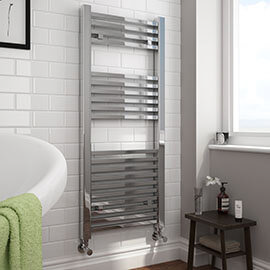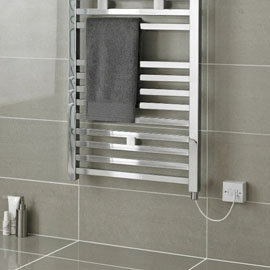UP TO 60% OFF SPRING SALE!
Free Delivery on Orders Over £499**
Traditional Towel Rails Buying Guides
Traditional Towel Rails Buying Guides
Ladder Heated Towel Rails
- Shower Trays
- - Rectangular Shower Trays
- - Quadrant Shower Trays
- - Square Shower Trays
- - Offset Quadrant Shower Trays
- - Pentagonal Shower Trays
- - Slate Effect Shower Trays
- - Walk In Shower Trays
- Shower Cabins
- Quadrant Shower Enclosures
- Square Shower Enclosures
- Rectangular Shower Enclosures
- Frameless Shower Enclosures
- Offset Quadrant Shower Enclosures
- Shower Side Panels
- Shower Doors
With the trend for period bathrooms still as popular as ever, we know that getting exactly the right fittings to create a timeless look is an essential piece of the puzzle. That's why our massive selection of traditional radiators and towel rails is designed to give off a charming, nostalgic look, effortlessly complementing other period fixtures you may have. In this guide we'll look at the benefits these radiators can bring.
Are traditional designs right for me?
If you want your bathroom to have as authentic a period look as possible then our traditional radiators and towel rails are definitely going to be right for you. There are plenty of different designs and finishes available including chrome, white, black, gold and copper so if you've got a particular style in mind then chances are you'll be able to find exactly what you're looking for right here.
Radiator or towel rail?
Deciding whether you need a traditional radiator or a heated towel rail will usually come down to the amount of available space you have. If you happen to have a large bathroom then a radiator will be a better choice as it will have a higher BTU, whereas if space is tight, say for instance in an en-suite or guest bathroom, then a heated towel rail will definitely be ideal as it'll allow you to adequately heat the room without taking up too much space. Your visitors will appreciate the warm towels too!
What does BTU mean?
This stands for British Thermal Unit and it's essentially a rating system that details how much heat a radiator emits. It tells you how much energy is used to heat one pound of water by one degree Fahrenheit. The higher this number is the more heat a radiator will produce - check the product description to see the BTU rating.
Installation
If you've tackled this kind of installation before then you'll have no issues fitting a traditional radiator or heated towel rail yourself. For complete DIY amateurs though, we highly suggest using a professional to carry out the job for you.

